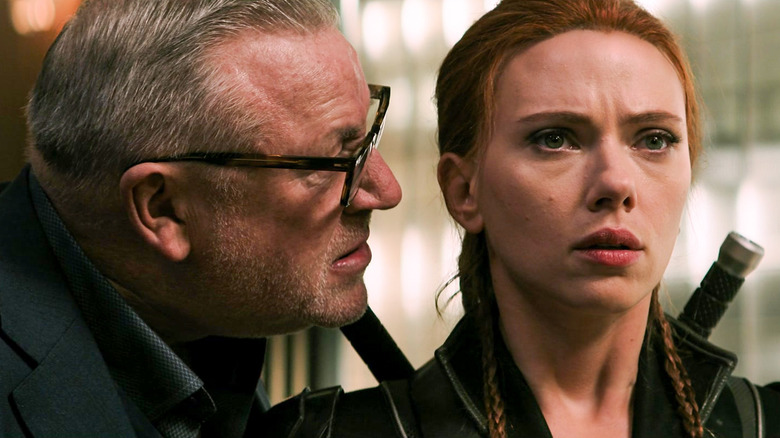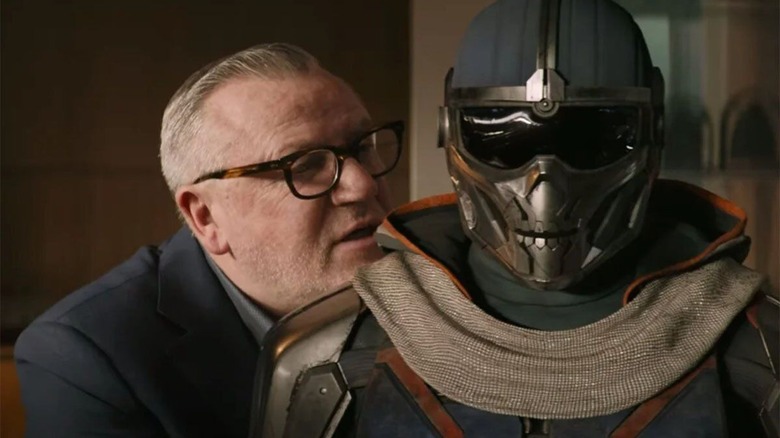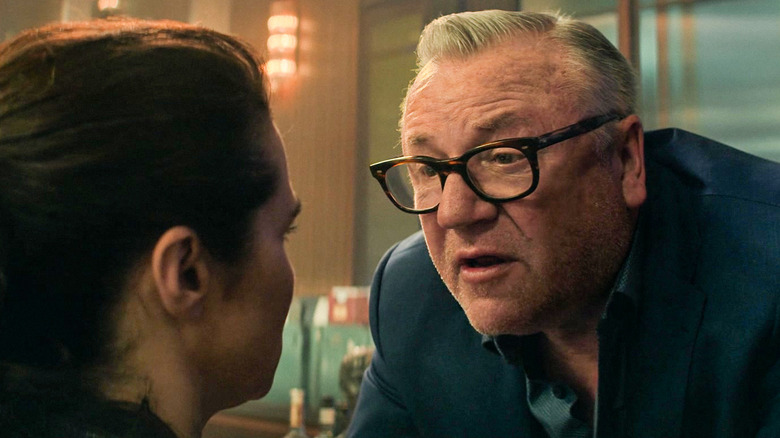A Detrimental Black Widow Experience Had Ray Winstone Wanting To Quit
In Cate Shortland's 2021 spy thriller "Black Widow," Ray Winstone plays a heartless Russian spymaster named Dreykov who oversees a shadowy training program called the Red Room. For years, Dreykov has been kidnapping young girls and forcing them to train as assassins and spies in a mysterious facility nicknamed Red Room. He is effectively turning girls into brainwashed super-agents — Black Widows — for the Soviet Union, then later, Russia. The titular Black Widow is Natasha Romanoff (Scarlett Johansson) a good-hearted spy who broke her programming, defected, and turned to the side of good. The plot of Shortland's film involves Natasha and several other former Russian super-agents tracking down Dreykov and shuttering the Red Room.
"Black Widow" is largely unremarkable, perhaps better known in 2024 for the unfortunate circumstances under which it was released. The film was infamously delayed because of COVID-19 lockdowns, and then released onto Disney+ (for a hefty rental fee) the same day it opened in theaters. "Black Widow" opened to a respectable $80 million at the box office, plus another $60 million from Disney+ Premier Access sales. Regardless, that was considered low for a film in the Marvel Cinematic Universe.
One of the reasons MCU movies are so expensive is that they tend to undergo extensive reshoots and VFX tweaks. "Black Widow" was even more expensive, costing about $288 million. Executives would come in after scenes had been shot and insist that the director reshoot some of them. This was the story given by Ray Winstone, who recently spoke with the Radio Times about his negative experience on "Black Widow" experience — including producers demanding that he give a weaker performance.
'It's like being kicked in the balls'
When Shortland was directing initial takes for "Black Widow," Winstone was fine with his work and with the production. It wasn't until he was called back for additional filming that the experience became miserable. When the bean-counters started to get involved, and Winstone realized he was contracted to keep on working, he found the soullessness of the enterprise to be overwhelming. If it hadn't been for the litigiousness of the matter, he would have even quit. The actor explained:
"It was fine until you have to do the reshoots. [...] Then you find out that a few producers have come down, and your performance is too much, it's too strong ... That's the way Marvel works. It can be soul-destroying because you feel like you're doing great work. [...] I actually said, 'You ought to recast it because that was it for me.' And you end up doing it again because you're contracted to do it. Otherwise, you end up in court. It's like being kicked in the balls."
Reshoots are common in the world of high-end Hollywood blockbusters, so "Black Widow" requiring reshoots was not in itself a sign of a troubled production. But it seems that it's possible to take things too far; one might recall the weeks of reshoots undergone by "The Marvels," for instance. It's likely that Winstone's performance was merely larger and more exciting — not worse — before reshoots, and that Cate Shortland had made the correct directorial decisions.
Marvel Reshoots
Winstone's complaints fit into a larger narrative about Marvel exerting excessive executive control over its projects. For the MCU, individual directors aren't so much the auteurs as the studio itself. The MCU is overseen by Marvel Studios president Kevin Feige, with directors often brought into films after actors have been chosen and a lot of pre-production work already done.
Marvel execs have come forward touting the importance of reshoots, and why so many of their films are tinkered with up to the last minute. In the massive coffee table book "The Story of Marvel Studios: The Making of the Marvel Cinematic Universe," by Tara Bennett and Paul Terry, Marvel co-president Louis D'Esposito said that reshoots were a means to sharpen a movie and make it better. He noted that building out a massive, interconnected cinematic universe required each film to be fine-tuned. "The only agenda is to make a great film," D'Esposito was quoted as saying, "And there's no fear at the last minute even saying, 'You know what? We can make this better.'"
One can see, however, how an actor, a writer, or a director would bristle at this attitude. If an artist had worked hard on a film, having thought it out very carefully, and took pride in their work, then it would be utterly obnoxious when an executive stepped in at the last minute and declared they could make your film better. Winstone is an actor who takes pride in his craft. It's no wonder he hated the dull tradition of Marvel reshoots.


